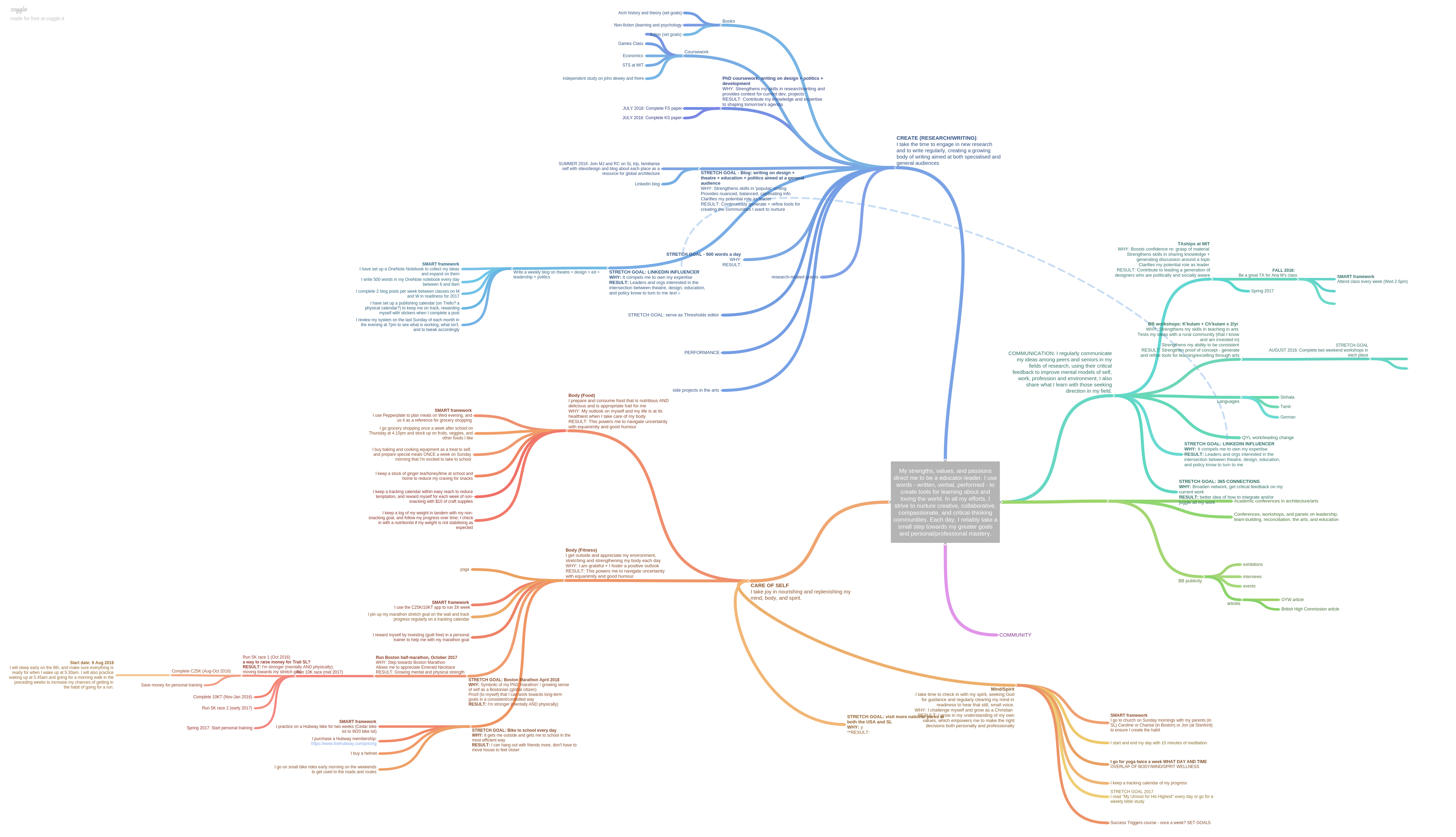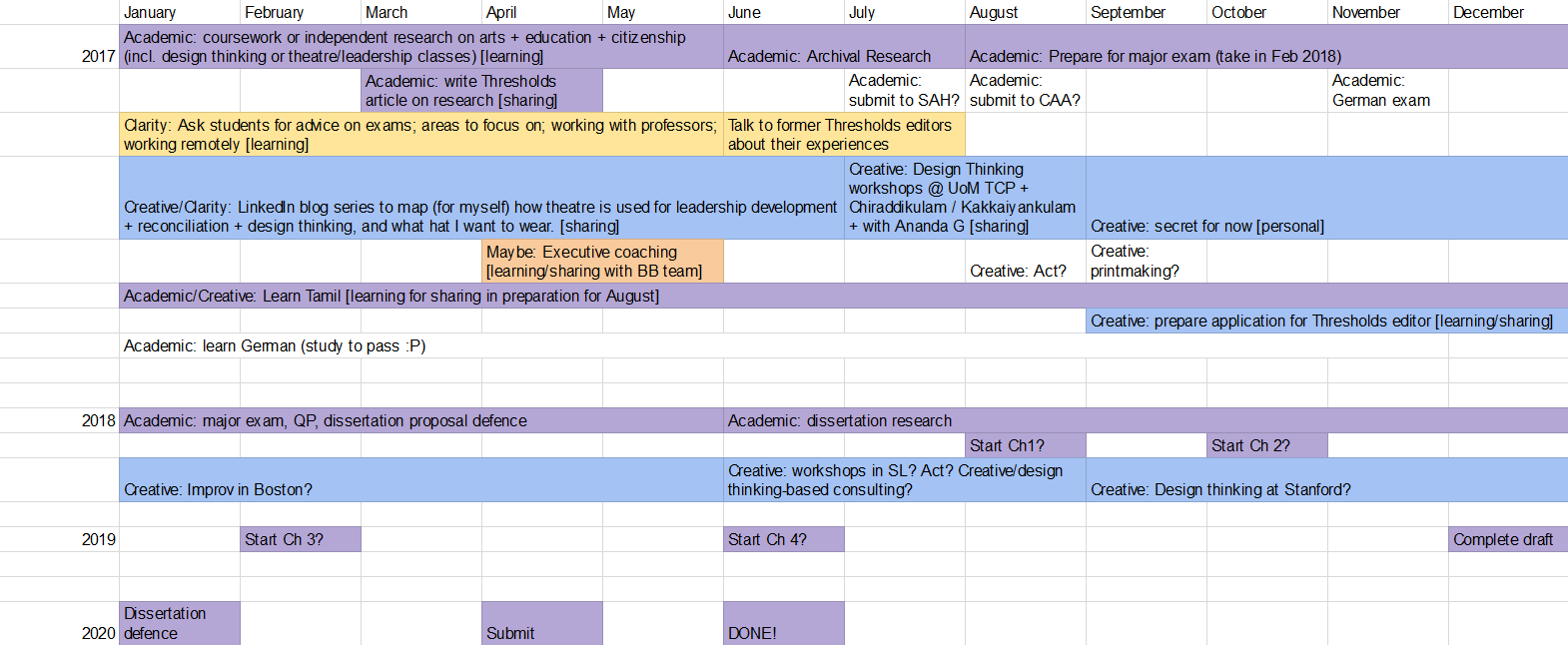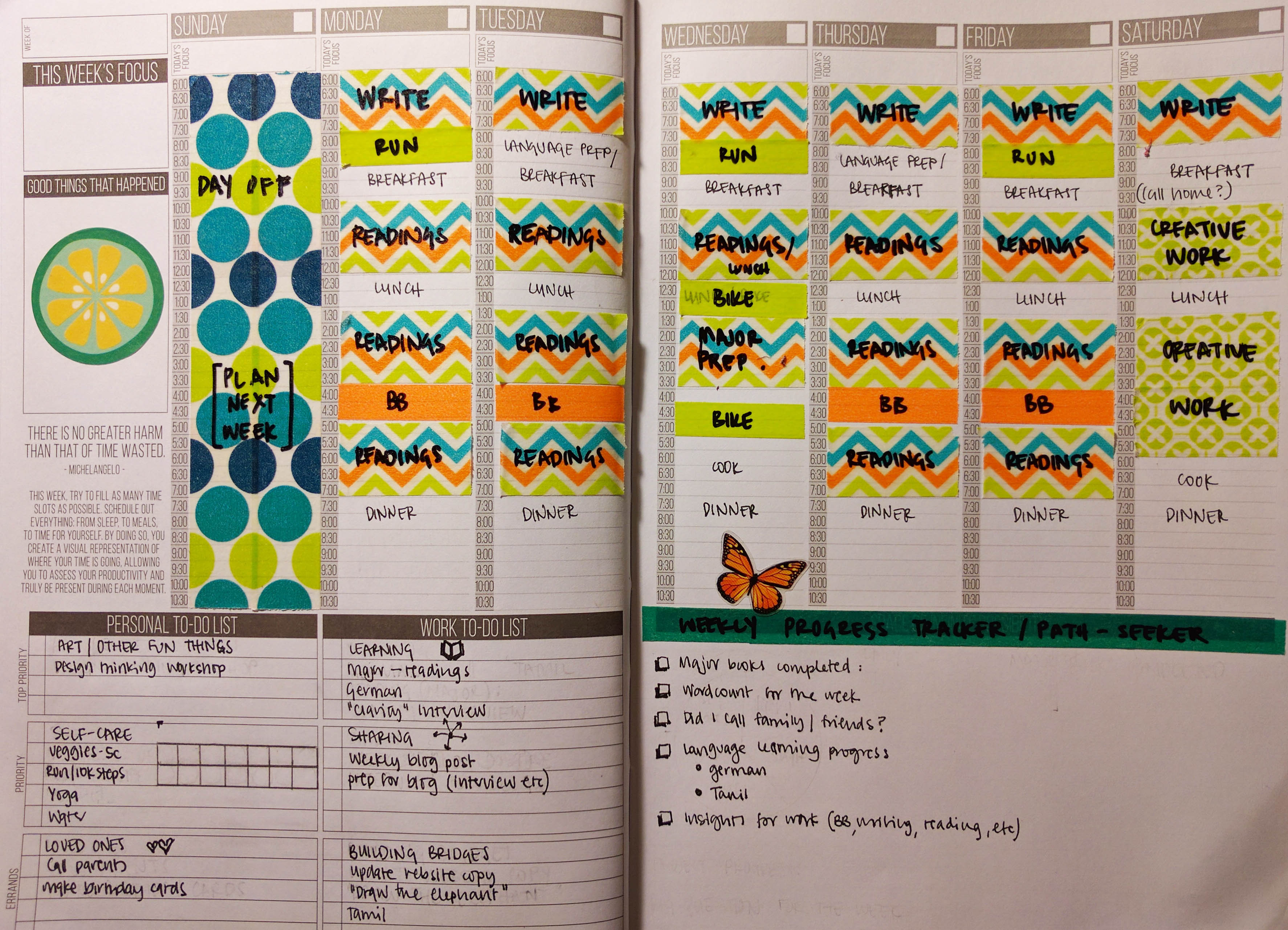A. Leading for the future
When asked to define leadership at the beginning of the year, I proposed we do away with the idea altogether, encouraging networks of interdependent and supportive collaborators instead.
Now that the year has come to a close, I’m not sure if I stand by my definition. On the one hand, I think that’s still my goal – to encourage those I work with to each take the lead in their areas. On the other hand, I have come to accept that this kind of encouragement is itself a form of leadership. It doesn’t happen automatically; it requires intent and skill.
I’m more prepared now to wholeheartedly accept the definition by Stephen Covey that I posted at the beginning of the year: to communicate to people their worth and potential so clearly that they are inspired to see it in themselves.
Based on what I’ve learned this year about listening to myself and my body, I would go a little further. To me, leadership means filling my heart with compassionate love for myself and all people, and filling my life with words and deeds that demonstrate that love at all times (there’s nothing like being loved to inspire loving others). Love is a strong word, and I subscribe to the view that it is a verb. It’s also hard to love others if I do not look at myself with the same compassion. If I take on too heavy a burden myself, what is stopping me from expecting the same of those around me?
I’m inspired in part by the realisation that I wish to be a great teacher, and by Eugenie Teasley’s observations that leaders can learn a lot from great teachers. I believe the best teachers do exactly what Covey describes, and my favourite teachers certainly did that for me.
Reflecting on my own leadership style in relation to my definition, I think that while I do have a fairly long way to go, I’m excited to have clarity on the kind of leader (and person) I aspire to be, and what areas I need to focus on to get there:
- I will specialise in my strengths, and delegate/not worry about everything else.
I cannot be the best at everything. QYL has given me a great deal of clarity on what my unique strengths are, and I plan to spend my time working largely on those areas. For everything else, I will work with people who are better than me to handle those areas, and constantly remind myself of the comparative advantage of guarding my time for what I’m absolutely best at. This way, I encourage everyone around me to own what they’re absolutely best at, too.
- I will spend as much time sharing as I will learning.
I can’t know everything before I embark on my journey – I end up procrastinating in my quest for perfection and am mediocre as a result. There is so much to be said for learning through doing, and in accepting that teaching is a two-way process. This is particularly hard for me, but I’m going to try to share nuggets of wisdom I gather in 2017 through blogging, podcasting, and live sessions. This means that I’m going to cut my ‘consumption’ to give myself more time to create and share.
- I will change how I communicate to others in the face of a challenge or problem.
Instead of immediately asking, “How can I help?” or offering what I believe to be the solution, I would like to start asking a version of, “Where do you believe you want to go?” and “What do you think might be some good ways to get there?” I’m hoping to enrol in a coaching course to help me frame these guiding questions better.
B. Self-reflection
- Since I was named a QYL, I’ve become more confident about frankly admitting to my strengths. While I’m still struggling with saying no and with delegating, finally accepting that there are things I’m truly super at has helped me stop trying to say yes to everything, because it’s made me want to guard my time for playing to my strengths.
- This realisation has had a ripple effect in my work. I’m scaling ‘down’ some of my ambitions for Building Bridges, because they’re not aligned with how I personally want to spend my time, while supporting my team to realise some projects that they strongly want to lead and are part of our mission, but not how I want to expend my own limited bandwidth. I’m seeing my role evolve into consultant and researcher, while freeing up the rest of my time to spend time in the villages where I started my journey. In my PhD work, I’m currently trying to focus on research that feels aligned to my interests in pedagogies of teaching (while acknowledging that I do love not having to answer to anyone about the potential ‘usefulness’ of the work I do).
- I think my proudest ‘sharing’ moment is when I led a design thinking workshop for a UN programme on youth and reconciliation. It felt like a real risk at the time, because if it didn’t work out, I would have embarrassed our group (and the UN office in Colombo) in front of Secretary-General Ban ki-Moon. What I realised, though, is that situations like these, everyone wants to succeed, and while I certainly made some egregious mistakes, it didn’t affect the final outcome and I now have a much better understanding of what’s possible in a single workshop.
- The best online conversations can’t compare to meeting everyone in person (something I didn’t have last year as a runner-up) and the residential week will always be my favourite memory of QYL…especially our impromptu dance party at Madingley.
- The biggest change to my ideas/values? Goodbye perfectionism. I mean, it’s a work in progress, but I believe I am making progress (one indicator – look at how much shorter this final assignment is than last year’s!). I’ve learned how toxic and unnecessary it can be.
- I surprised myself when I took on a hefty leadership role for the UN workshop, and found that despite some bureaucracy, that this kind of leading came naturally and that I enjoyed myself.
- This was a year of wonderful opportunities, accolades, and recognition, but I wouldn’t describe it as a year when things went well. I felt overwhelmed and overworked, and still have overdue projects to complete. Trying to avoid ever feeling like this again has led to the realisation that I don’t have to go chasing after opportunities and awards for clarity. There will always be opportunities for me to do what I love, and to do it really bloody well. Taking on far too many things made me see clearly what things I loved best, and that I could wake up and do with great joy even when I felt most stressed out: writing, research, and editing (and thinking up ways to make QYL even more fabulous). So while things didn’t go ‘well’, I grew mightily as a person.
- Advice for future QYLs: Self-care, self-care, self-care.
- I said yes to too many things in a search for clarity, and didn’t give of my best to any of them. Being absolutely clear about my strengths will enable me to say no to everything that is extraneous in future.
- One challenge for 2017 that fills me with mortal dread is sharing without fear of judgement. It’s not easy to make myself vulnerable to criticism, but I’m going to do it.
- My areas for improvement in the realm of leadership are also forms of self-improvement, so my goal for 2017 is to specialise, and achieve a more balanced learning to sharing ratio, and empower others to do the same.
- From now until 2020, I plan to spend 90% (or more) of my work-time on the things I do best: research, writing (and editing/synthesizing ideas), creating curricula, and theatre. I also plan to goof off more and hang out with friends/family more. I’m more confident now than I was before that clarity of purpose will follow: i.e. I’m less interested now in ‘being’ someone (thanks, island, for helping me shed labels) and more so in doing what make me buzz.
- By 2020, I hope the QYL network includes sustainable frameworks for regional projects, meet-ups, and opportunities for skill-sharing. In particular, I’d like to work alongside my regional QYLs share what we’ve been learning through Leading Change with other change-makers in the area.
C. Next steps
I will keep this section minimal. Too often, I write an ambitious list of things I want to achieve, and then never look at it again because getting there would require that I never sleep. Look at this ridiculous mind-map of goals I made in July in anticipation of this module – also in a more illegible form below:
It makes me tired, and I’m sure it makes you tired too. And look, I got so exhausted in the process of writing it that I didn’t have any energy left to fill in the section on how I would prioritise my community – definitely a bad sign. Also, some of those goals don’t really align with my sense of self anymore…and this was just five months ago! However, it did give me clarity on what my mantra would be (it’s the grey box in the middle), and what sorts of questions I should ask myself before I launch into any project.
2020 goal
My mantra is the only thing on my heinously impossible mind-map that truly resonates:
My strengths, values, and passions direct me to be a educator-leader. I use words – written, verbal, performed – to create tools for learning about and loving the world. In all my efforts, I strive to nurture creative, collaborative, compassionate, and critical-thinking communities. Each day, I reliably take a small step towards my greater goals and personal/professional mastery.
My goal for 2020 (and 2017) is to focus on working at the intersection of what I’m good at, what I love doing, what the world needs, and what I can be paid for, so that clarity of purpose will follow. In a nutshell, I want to focus on researching questions at the intersection of education in the arts and of citizenship, while taking time to practice as an artist. Here’s a handy-dandy diagram:
This means ruthlessly delegating (or doing a mediocre job of) tasks that might be necessary but not within my realm of expertise. I still think my PhD is the best training for honing my skills as an interdisciplinary researcher, but I don’t need to complete each requirement with the same dedication, or even write every paper with the same care.
My goal is to work towards my PhD while having one major creative side project at all times.
The greater vision is that while I am committed to doing ‘good’, I refuse to ever blindly assume that anything I do is unequivocally or objectively good. This is why I love being a researcher, and will always be one, rather than working 100% ‘in the field’. I’ve also come to accept that for me, ‘in the field’ can also mean ‘on the stage’ as an actor.
My greatest challenge is saying no to things that only align minimally with my goals. While the FOMO is real, I’m getting better at jettisoning things.
What I do want to do is show up every day, and take small steps in a consistent fashion. The best things come from habits cultivated over time, not one-time smash hits. So I’m scrapping the ambitious “run a marathon” or “write a book” goals and replacing them with the kind that look like this (and the ones below are real goals, not examples, but I’m keeping them short to be manageable):
Run (or exercise) every other day for 30 minutes (self-care bucket)a
Write 500 words in two hours every day (learning/sharing bucket)
Call or email a loved one every day (family/friends bucket)
What will help me reach these goals is to have three concise lists: strengths to build, questions to constantly calibrate my internal compass, and daily/weekly tasks in five categories (learning, sharing, arts, family/friends, self-care) to complete without fail. I will design this little path-seeking list over the Christmas break, and carry this note with me in my wallet.
Example questions to use in any circumstance:
Will this [academic paper/speaking gig/conference/guest blog/play] be an effective way to build my [writing/speaking/performing] strength?
What will I [learn/share/create] through this opportunity and why is it important?
Have I spent enough time on [self-care/loved ones/art – usually the three I leave for last] this week?
To reach this goal, I will swap out perfectionism/procrastination for daily diligence, impostor syndrome for embracing my strengths, and guilt-about-privilege for gratitude-for-opportunities.
I definitely have some secret projects in the works, but they will evolve as the answers to my “path-seeking list” questions evolve. For example, one project is a fortnightly blog series on people using theatre in unusual ways, inspired by Lauren Currie’s “X designer” series (you can see an example here) which is in turn inspired by the Introductor blog, and I already have my two incredible interviewees lined up for January. I’ve also told Lauren about how she’s inspired my project, and she’s offered to share it with her network when I launch. (EEE!) For now, I feel that it lines up perfectly with my learning and sharing goals (in particular, write 500 words a day) and is very much in line with sharing what I learn, and doing away with perfectionism (each blog post is literally four questions). If I can no longer answer “yes” to my questions, then the series will be changed or be chucked.
Below is a screenshot of my five-year plan, the title of which is in a dumb joke-for-self – look up Soviet (or Indian) five-year plans and prepare to roll your eyes. It’s a reminder not to get too wedded to an idea when it becomes clear that it is unfeasible or potentially catastrophic. Mine is on Google Sheets, so it can be changed! (This one already needs updating, and I created it on the 26th of November.)
2017 goal
In the spirit of keeping things simple, my goal for 2017 is the same as that for 2020 (and so are my vision, challenge, assets to reaching my goals, and things to overcome).
My word for the year (the idea is filched from Claire Diaz of Twitter) is selectivity – thinking of saying “no” as judiciously picking projects and savouring my precious time rather than limiting myself.
My monthly and 6-month goals (as evidenced in my five-year plan) are much simpler than those from last year – I felt burned out and exhausted for a great deal of this year, and I am looking forward to having space to breathe next year. This time around, my goal is simultaneously easier and harder than last year: simply to be consistent in what I do each day, rather than trying to pack in a bunch of milestones. The milestones will come as a result of what I do, rather than being what I begin with. (Also, if that was a five-year plan, what happens in 2021? GLORIOUS AND UNCERTAIN ADVENTURE, THAT’S WHAT.)
To track my consistency, I will use the wonderful Passion Planner that Alicia gifted me. Below is a picture of a “model” week – I make time for focused PhD work, creative work, long meals, and a day off. I have also turned my to-do list section into a goal tracker for each area of my life (learning, sharing, BB, art, self-care, and community). Obviously nothing will go down exactly like these plans in real life, except perhaps for how much washi tape I use on my planner, but having a model helps me figure out how to keep on track.
Bring it on, 2017.



